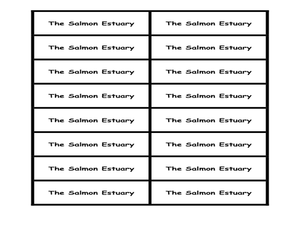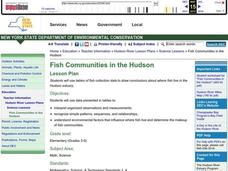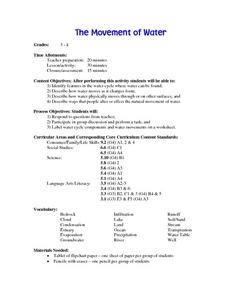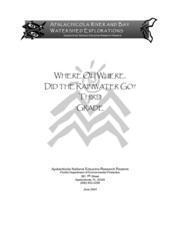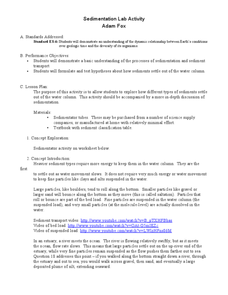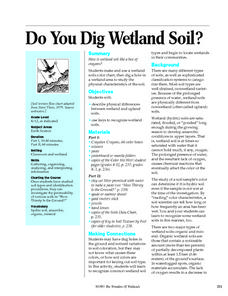Curated OER
The Salmon Estuary And Human Impacts
Students have discussions and complete activities about the pacific salmon life cycle and marine parasites. In this salmon lesson plan, students complete activities such as observing sea lice, playing a tag game, and a board game.
Curated OER
New Jersey Estuaries
Young scholars experiment to discover that salt water is denser than fresh water by creating color coded solutions. They examine how heavy rainstorms and high tides develop layers of different degrees of density.
Curated OER
Math and Science in a Wetland
Students use scientific methods during field and lab investigations. Students collect specimens and make measurements using the metric system. Students describe biotic and abiotic factors in an estuary and design a model.
Curated OER
Fish Communities in the Hudson
Learners use tables of fish collection data to draw conclusions about where fish live in the Hudson Estuary. Given available data they interpret organized observations and measurements and recognize simple patterns, sequences, and...
Curated OER
Determine Soil Particle Size
Students examine various soil samples in groups. Using the samples, they identify the characteristics of them and calculate percolation and infiltration rates. They use this information to discover why some species can survive in one...
Curated OER
The Movement of Water
Here is an excellent lesson plan on the water cycle and the states in which water exists. Learners identify the features of the water cycle, describe how water changes form, and look at ways that people affect the natural movement of...
Curated OER
Dining Out With Fishes and Birds of the Hudson
The class will make observations to determine how environment has shaped the way particular birds and fish eat. They will view a series of photographs, read two short articles, and then consider how food availability has determined how...
Curated OER
Water Filtration
As an example of nature's water filtering system, young ecologists conduct an experiment in the lab. They construct a funnel out of a plastic bottle, fill it with specified layers of materials that simulate layers of soil, then run muddy...
Curated OER
Plankton in the Air
Here is a lab activity adequate for use with any full lesson on environmental factors that shape animal adaptations or marine animal characteristics. Pupils will discuss the role plankton plays in the environment and filter-feeding...
Curated OER
Stacking Water
Learners experiment with different salinities of water using straws and different colors of water. They collect and interpret data from the experiment.
Curated OER
A Tale of Two Wetlands
Students observe 2 separate wetlands (following downloadable worksheets) and record 10 similarities and 10 differences between them. Then they present their recommendations to the class who roleplay the government's wetland conservation...
Curated OER
Is the Hudson River Too Salty to Drink?
Students explore reasons for varied salinity in bodies of water. In this geographical inquiry lesson, students use a variety of visual and written information including maps, data tables, and graphs, to form a hypothesis as to why the...
Curated OER
Where Oh Where Did the Rainwater Go?
Third graders conduct an experiment to determine how water moves through different soils found in the Apalachicola River watershed. They read a scenario, conduct the experiment, answer follow-up questions, and draw the water movement...
Curated OER
Salt Marsh in a Pan
Students create a model of a salt marsh to discover the impact of pollution and human activities on water-based habitats including bays and the ocean. They recognize the relationship between natural and developed areas. Students impact...
Curated OER
Sedimentation Lab Activity
Learners predict how sediments in a water column will settle. In this earth science lesson, students examine the layers of sedimentation. Learners are given sediments to place into a column of water and observe how they settle....
Curated OER
The Journey of the Pacific Salmon
Students examine the journey of the Pacific salmon. In this salmon species lesson, students review the stages of the salmon life cycle and conduct an experiment to determine how the water and habitat changes during each stage.
Curated OER
Interpreting Paleoenvironments With Microfossils
Students gain a better understanding of how scientists can use foraminifera to interpret past environments. Specifically, students have the opportunity to explain one of the basic tenets of geology - the present is the key to the past.
Curated OER
Rising Sea Levels: UK and Bangladesh
Students explore the possible effects of global warming. In this geography/global warming lesson, students identify regions using an atlas and complete a global warming worksheet. Students perform an experiment in which they simulate...
Curated OER
Caution: Fix It!
Students explore the concept of environmental stewardship. In this science lesson plan, students investigate events that have harmed coastal resources and how human activity has restored coastal resources.
Curated OER
Sea Level and the Terrapin
Students study the habitat of the terrapin. In this terrapin lesson plan, students create a diorama of the habitat of the terrapin. Students also simulate how it would look if people moved into the area and how predators can threaten...
Curated OER
Water filtration with Plants
Sixth graders explain how soil and plants effect contaminated water in nature. In this filtration lesson, 6th graders work in groups to test biofiltration units. Students determine which biofiltration units work best and how they can...
Curated OER
Salty Solutions
Students measure salt content in water. They determine salt content of four samples using a hydrometer.
Curated OER
pH Potential
Pupils experiment to determine the positive and negative impacts of human activities on environmental change. They examine how physical and biological processes such as decomposition affect soil characteristics while looking at the pH of...
Curated OER
Do You Dig Wetland Soil?
Students study the physical differences between wetland and upland soils. They match colors to the different levels of the soil after digging holes. They create soil color charts and chart the texture of the soils.
Other popular searches
- Estuary Environments
- Estuary Project
- Estuary Ecosystem
- Marine Ecosystems Estuary
- Estuary Food Chains
- Food Chain Estuary
- Estuary and Mangroves
- Estuary Invertebrates
- Food Web Estuary
- Marine Biology Estuary
- Aquatic Ecosystems Estuary
- Estuary Water Biomes


